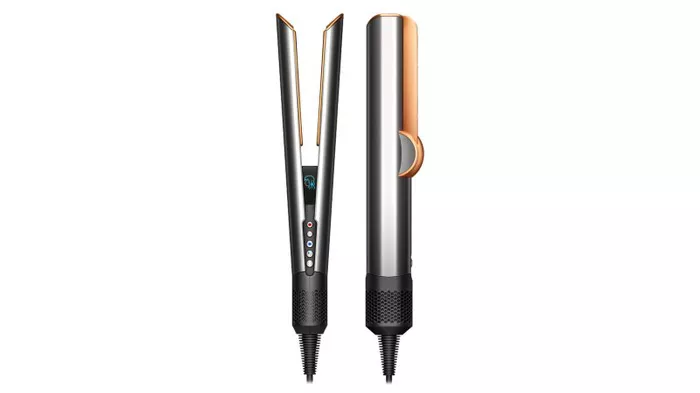Dyson’s highly anticipated Airstrait hair straightener, touted as a revolutionary tool for all hair types, has sparked significant backlash following a recent advertisement featuring a Black model with 4C hair. The Airstrait, which promises to deliver a wet-to-dry straightening experience with no heat damage, has been marketed as a game-changer for curly and textured hair. However, the product’s real-world performance on coily hair has raised doubts among some consumers, particularly those in the natural hair community.
Controversial Advertisement Raises Concerns
The controversy began when Dyson posted a short video on its official social media channels showcasing the Airstrait’s capabilities. The video, which has since been removed, featured a Black model with tightly coiled hair. After using the Airstrait on a section of her hair, there was little visible change. While her hair appeared slightly looser, it was far from straight.
The video quickly sparked frustration among viewers, particularly on platforms like X (formerly Twitter), where many questioned the product’s suitability for 4C hair. Some users accused Dyson of falsely advertising a product that wasn’t effective for textured hair, while others speculated whether the device was even turned on during the demonstration.
One user posted, “Dyson know they wrong as hell for this,” while another commented, “They’re purposely showing us that they created a product unsuitable for our hair.” Several viewers suggested that Dyson was merely “checking the box” on inclusivity without addressing the unique needs of Black hair.
Dyson Responds to Criticism
The Airstrait, priced at $499.99, promises to cut drying time and deliver a straightening effect without the damaging heat typically associated with traditional flat irons. Given the high price point and Dyson’s established reputation for effective hair tools, customers expected significant results from the Airstrait, particularly for those with textured hair.
Dyson responded to the backlash with a statement to Refinery29, acknowledging that the advertisement did not demonstrate the product’s full potential for coily hair. The company emphasized that the Airstrait is designed for all hair types and is especially effective for “stretching” coily hair if that is the desired result. Dyson clarified that the tool is best used as a step in a hair care routine rather than for achieving perfectly straight hair in one pass, and that the video did not effectively communicate this feature. As a result, the company decided to remove the post.
Support From Natural Hair Experts and Users
While the advertisement may have fallen short in its marketing, many natural hair professionals and beauty creators defend the Airstrait’s performance. Josiane Konaté, an entrepreneur and content creator who specializes in textured hair, shared her positive experience with the product. “It does live up to the claims,” Konaté told Unbothered. “It’s a hair straightener that takes your hair from wet or dry to straight, with no hot plates and no heat damage.”
Konaté explained that, while the tool is not a flat iron, it does perform as promised, especially when used correctly. She added, “The Dyson Airstrait CAN take 4C from wet to straight with one pass when you section your hair in small parts. If you want to lengthen your hair more, you need more passes.”
Other natural hair influencers have also praised the tool’s ability to dry and straighten hair with minimal heat, noting that it’s particularly beneficial for reducing heat damage, a common concern for textured hair. However, they agree that for best results, users should be mindful of sectioning their hair properly to ensure an effective outcome.
Looking Ahead: A Lesson in Inclusive Marketing
The Dyson Airstrait’s launch highlights an ongoing issue within the beauty industry: the need for brands to understand the complexities of textured hair and to deliver on inclusivity promises with products that actually meet the needs of diverse consumers. Dyson, which has a history of creating hair tools with a range of attachments for various hair types, will likely need to reassess how it markets products to Black consumers and ensure its messaging aligns with the capabilities of its products.
While the Airstrait may still prove to be an innovative tool for many users, the controversy surrounding its debut underscores the importance of thoughtful, informed marketing when it comes to textured hair. As the product continues to gain traction, it will be crucial for Dyson to address these concerns and clarify its messaging to avoid further misunderstandings in the future.
Related topics:
- Victoria Beckham Debuts Chic Ponytail, Channeling Audrey Hepburn
- Smile Hair Clinic: Istanbul’s Leading Destination for Hair Transplants
- Anti-Hair Loss Helmet for Chemotherapy Patients Wins 2024 James Dyson Award


